Swan Theatre, Stratford upon Avon
****
Written by Christopher Marlowe
Directed by Justin Audibert
****
Written by Christopher Marlowe
Directed by Justin Audibert
 |
| Jasper Britton |
Christopher Marlowe’s The Jew of Malta play takes a tale of cunning and avarice, love and hypocrisy and strips it down to the basest of humanities at its core. Barabas the Jew is a man for whom it is possible to feel both compassion and disgust. He hadn’t chosen his calling, having first been a physician, then an engineer and finally a usurer. Yet it is in that money-lending role that he is singled out by Ferneze, Malta’s Christian governor, to fill the island’s war chest or face conversion to Christianity. And as the Muslim Turks threaten Malta, so do we find Marlowe sketching out a contemporary, if troubling resonance, as the three Abrahamic faiths challenge each other
Justin Audibert’s intelligent production sees Jasper Britton give a warmth and joie de vivre to Barabas that one might not have expected from a man destined to ultimately wreak hideous revenge. Britton’s wiles and connivances serve only to endear him to the audience, whom he plays beautifully, with a string of raised eyebrows and intimately glanced asides. An unexpected counterpoint to the Jew is Ithamore, his Moorish slave. Lanre Malaolu bounces and clowns across the stage as we witness the slave perversely worming his way deeper into the affections of his master.
The threatening Turkish armada is led by Calymath, ably played by Marcus Griffith in true swashbuckling form. As the intrigues of the plot, riddled with treachery and deceit lead to an inevitably tragic conclusion, we witness the duplicity of inter-faith conflict alongside an even more painful intra-familial despair as Barabas and daughter Abigail, (sensitively and spiritedly played by Catrin Stewart) both come to despise the other, with fatal consequences.
Steven Pacey’s Ferneze displays a recognisable statesman-like duplicity, as he schemes both with and against Barabas to defend his nation, whilst we catch but a glimpse of Marlowe endorsing his own personal inclinations when Simon Hedger’s Merchant says ‘I count religion but a childish toy’.
In a production that thrills, Jonathan Girling’s music enhances proceedings. His introduction however of a 19th century klezmer sound, whose history derives from the European Ashkenazi Jewish community whereas Malta’s Jews hailed from a distinctly Mediterranean Sephardi heritage, does seem a little incongruous.
But elsewhere the detail invested in The Jew Of Malta is meticulous, manifest in the clarity, diction and playing of the company for whom neither a syllable nor glance is wasted. Bringing their world class style to this Elizabethan classic, with Lily Arnold’s plainest of sets proving a foil to magnificent costumes, The RSC again deliver magnificent theatre.
In repertory until 29th August 2015





%2Bin%2BLaurie%2BSlade's%2Badaptation%2Bof%2BThe%2BFather%2Bat%2BTrafalgar%2BStudios%2B2.%2BCredit%2BSimon%2BAnnand.%2B(2).jpg)




